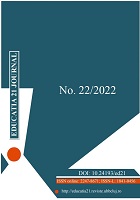Perceived Classroom Assessment Environment and Autonomous Motivation as Predictors of Students’ Achievement Emotions in Relation to Learning for Baccalaureate Exam
Perceived Classroom Assessment Environment and Autonomous Motivation as Predictors of Students’ Achievement Emotions in Relation to Learning for Baccalaureate Exam
Author(s): Versavia Curelaru, Georgeta DiacSubject(s): School education, Higher Education , Educational Psychology
Published by: Universitatea Babeş-Bolyai
Keywords: achievement emotions; perceived classroom assessment environment; autonomous motivation; baccalaureate exam;
Summary/Abstract: Achievement emotions constitute an important individual variable in the complex process of self-regulated learning, through its effects not only on student's well-being, but also on academic performance. Exploring the individual and contextual correlates of this type of emotions experienced by students in the educational environment is important for both improving the learning climate and developing an optimal self-regulation. In this study, the analysis of data obtained from a number of 365 participants showed that students' perceived classroom assessment environment in the Romanian Language and Literature subject matter in high school is a significant predictor of the emotions experienced by students during learning this subject for baccalaureate exam, beyond the effect of autonomous motivation and previous academic performance. The results showed that perceived learning-oriented assessment environment was positively correlated with students' autonomous motivation. Moreover, it proved to be a positive predictor for the enjoyment in learning, and a negative one for anger and hopelessness, while its correlation with anxiety or boredom was not significant. In contrast, the perceived performance-oriented assessment environment was uncorrelated with students' autonomous motivation and enjoyment, but was confirmed as a positive predictor of anxiety and boredom experienced during individual learning. Finally, the results and some educational implications are discussed.
Journal: Educatia 21
- Issue Year: 2022
- Issue No: 22
- Page Range: 50-64
- Page Count: 6
- Language: English

